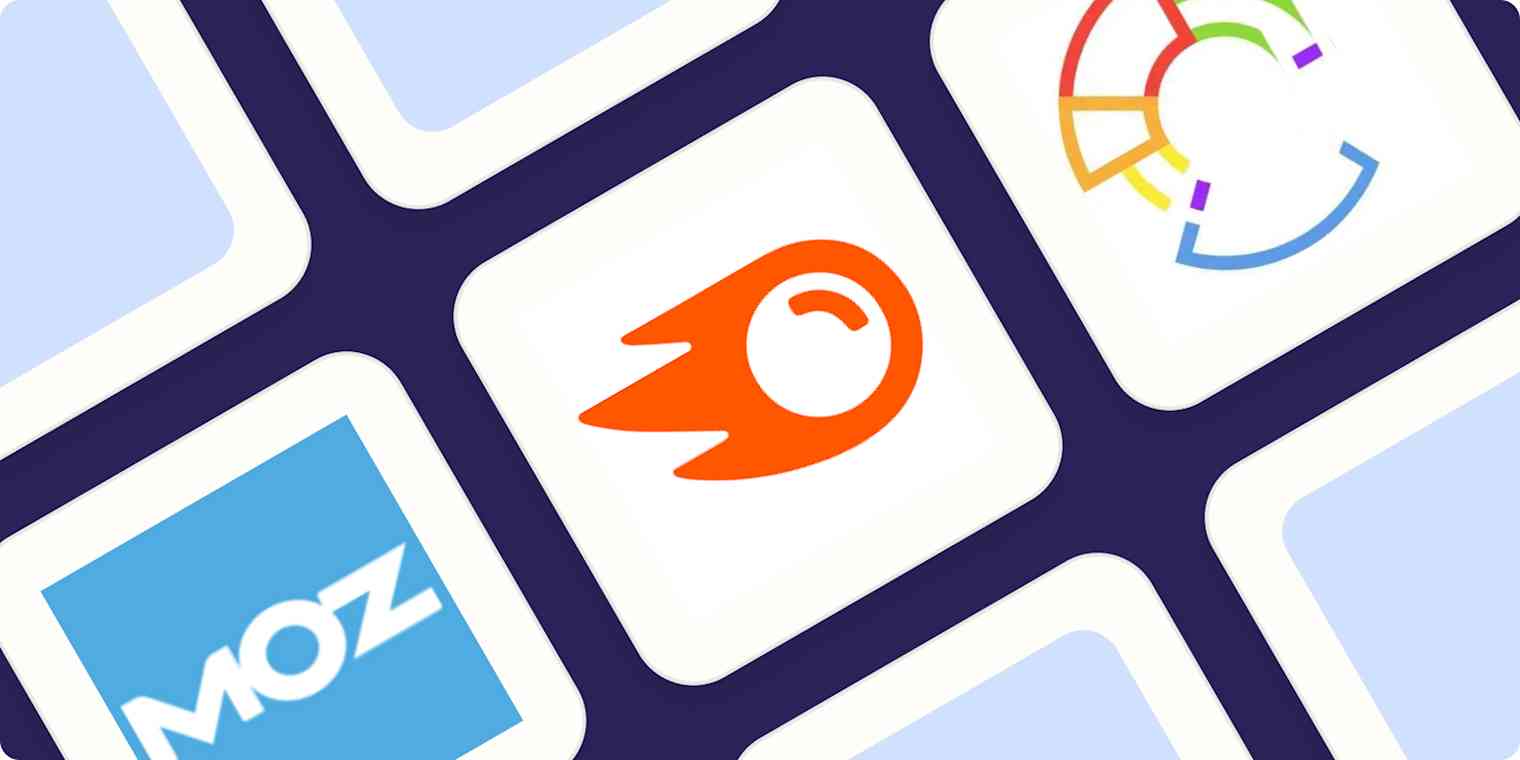There's no shortage of tools purpose-built for keyword research (literally hundreds of them), and they run the gamut from beginner-focused to highly advanced. They also range from totally basic and unhelpful to super valuable.
When done right, the best keyword research tools simplify and streamline your workflow—they make it easier to find the right keywords to target and give you the data you need to actually rank for them. But they shouldn't require you to empty out your bank account and sell your first-born child in order to access that data.
After years of working with multiple clients who use all different tools for keyword research and SEO content optimization, I've seen the best (and the worst) of them—and I know how important it is to choose the right keyword planner tool. To help, I considered over 70 tools with a free option for keyword research. After in-depth testing, here are the four best free keyword research tools, including the all-around greats and apps built for more specific use cases.
The best free keyword research tools
Moz Keyword Explorer for the best all-around free SEO keyword research tool
Google Keyword Planner for researching paid keywords
Ahrefs for simple SEO tools
Semrush for advanced SEO professionals
What makes the best keyword research tool?
How we evaluate and test apps
Our best apps roundups are written by humans who've spent much of their careers using, testing, and writing about software. Unless explicitly stated, we spend dozens of hours researching and testing apps, using each app as it's intended to be used and evaluating it against the criteria we set for the category. We're never paid for placement in our articles from any app or for links to any site—we value the trust readers put in us to offer authentic evaluations of the categories and apps we review. For more details on our process, read the full rundown of how we select apps to feature on the Zapier blog.
The features that make for a great keyword research tool are pretty straightforward: you search for a given keyword, and the tool tells you about it. But there are so many different ways to use keyword data, so I wanted to find tools that could handle a variety of use cases, along with a few designed for some of the most popular uses for keyword research.
During testing, I looked primarily at the factors below to determine which apps made our initial list.
Data included. The best keyword research tools give you all the data you need to rank for your chosen keyword. All of the apps we selected include, at minimum, traffic, keyword difficulty, and competitive SERP analysis.
Data sources. You should be able to trust that your keyword data is free of errors and biases, so considering where the data in each keyword research tool comes from was an important step for us. Every tool we included pulls data in from Google Analytics or Google Search Console at a minimum.
Keyword optimization guidance. You shouldn't have to be a 10-year SEO industry veteran to use keyword research tools—the best tools offer simple, straightforward suggestions to optimize for your keywords. There are tools (like Ahrefs, Semrush, and Moz) that do complete SEO analysis on your site, checking for everything from site speed and technical details to domain authority and topic clusters. That's not what we're looking for here. We're looking for tools that any business owner or marketer can use to quickly understand their target keyword and optimize their site to rank for it.
Free plan allowances and upgrades. Some tools include super limited results for free and call it a "free plan." Or they put time limits on the free plan, effectively making it more of a trial. I only included tools with evergreen free plans generous enough to actually be useful—and they won't break the bank when it's time to upgrade, either.
Standalone functionality. Since you're looking for something free, your keyword tool should be a one-stop shop—without requiring any additional tools or extensions to work for you, especially not ones you'd have to pay for.
To find the best of the best, I put each tool that checked those boxes to the test by running through an in-depth protocol. Here's what my testing workflow looked like:
If needed, I created an account and went through any provided onboarding or guided tutorials (many of these free apps don't require account creation or provide any onboarding).
I searched for a few different kinds of keywords—e.g., "free keyword research tools," "chocolate cake," and "best white sneakers"—to see the results for different search intent.
I checked which related keywords, metrics, and other data were offered. I also made note of the source, whether information was pulled from Google, included non-search engine websites (like social media or forums), or was drawn from the tool's own native data.
I verified allowances for the free plan—whether limited by time, number of results, metrics included, searches per day or month, or something else—and the cost to upgrade to a paid plan if needed.
Where available, I tested out additional keyword research tools like competitive gap analysis, content optimization features, and more.
After spending over a dozen hours with these apps this year, I landed on the four best keyword research tools—each with a manageable free version—below.
The best free keyword research tools at a glance
Best for | Stand-out feature | Free plan | |
|---|---|---|---|
An all-around solution | "Priority" score for determining valuable keywords | 10 queries per tool per month, with 1,000 keyword suggestions and 10 SERP analyses per query | |
Researching paid keywords | Forecasting features and budget planning | Completely free (but you get more out of it if you use Google Ads) | |
Breadth | Includes keyword research for YouTube, Amazon, and Bing | Free Keyword Generator with up to 150 keyword suggestions; Keyword Difficulty Checker with difficulty score and SERP analysis for the top 10 results | |
Advanced SEO professionals | Granular keyword data | 10 Analytics reports per day, 10 tracked keywords |
The best free keyword research tool overall
Moz Keyword Explorer (Web)
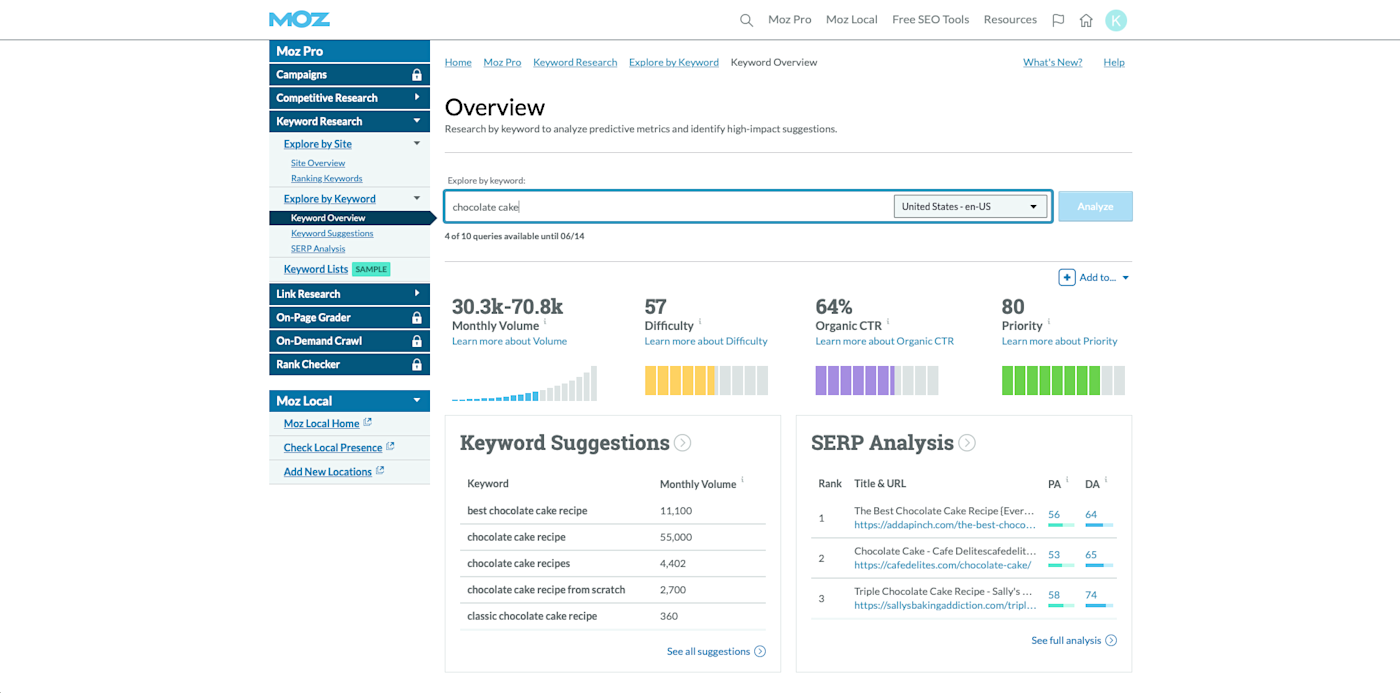
Moz pros:
More approachable data presentation than many other tools
"Priority" score makes it easy to find the keywords worth chasing
Broad set of tools available for free
Moz cons:
Less data than more robust tools
Free plan only includes 10 queries per tool per month
Moz's SEO platform offers several different tools designed for keyword research. While Moz doesn't include as many data points as some of the other full-featured SEO tools (like SERP position history or the total number of keywords a competing result ranks for), I'd consider that a benefit. It makes for a less overwhelming user experience for those who aren't professional search marketers, without skimping on the metrics you really want.
With the Keyword Explorer tool, you can search any keyword you choose and see its monthly volume, difficulty, and organic clickthrough rate (CTR). Scroll down from there to see an analysis of current results ranking for it and suggestions for similar keywords.
My favorite feature: Moz includes a "Priority" score that simplifies keyword research by giving you the bottom line on whether a keyword is worth chasing for you. Moz automatically calculates the score based on the keyword's volume, organic CTR, and difficulty, along with your "My Score"—a metric you set yourself, designating how important a given keyword is to your business, based on your own expertise and knowledge of your business and industry.
Plus, with the Keyword Gap feature (part of the Competitive Research tool), you can find all the keywords your competitors rank for that you don't.
Moz pricing: Keyword research features are available for free for up to 10 queries per tool per month with up to 1,000 keyword suggestions and 10 SERP analyses per query; Moz Pro plans start at $99/month for 150 keyword queries per month
The best free keyword research tool for paid keywords
Google Keyword Planner (Web)
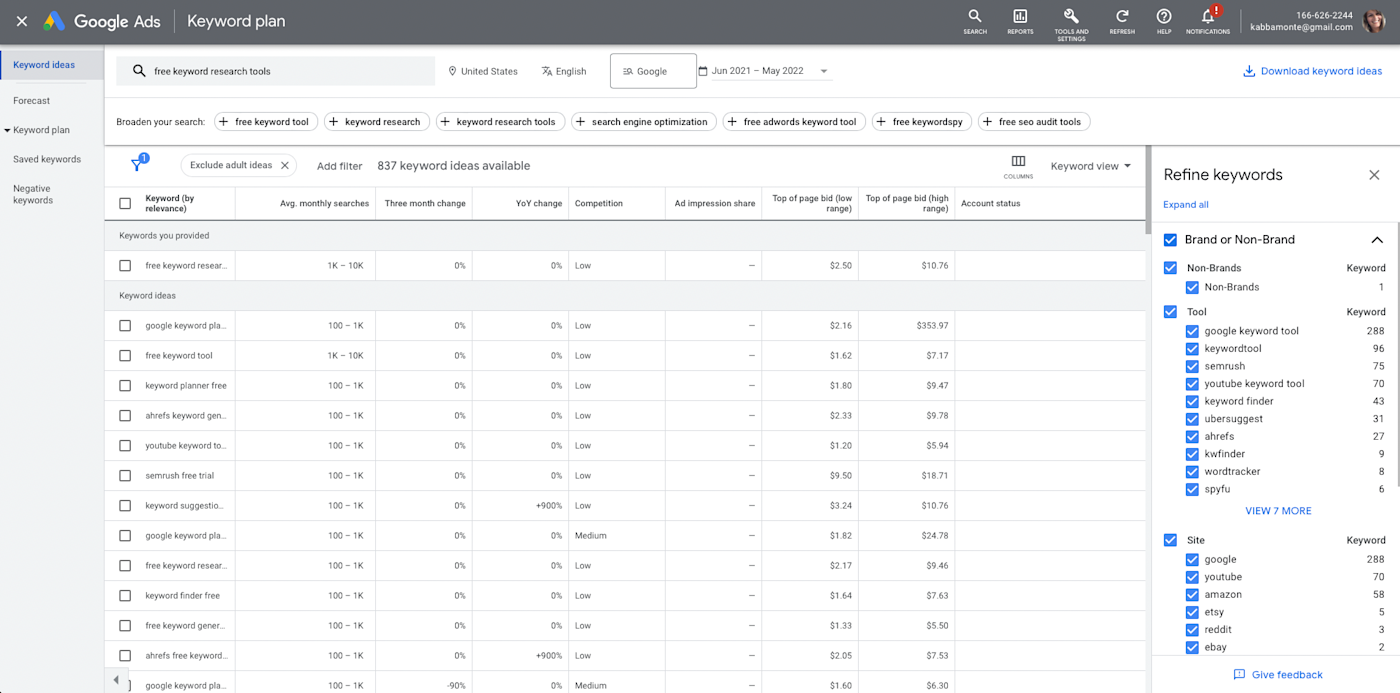
Google Keyword Planner pros:
Completely free forever, even if you don't use Google Ads
Helpful forecasting features for budgeting if you do use Google Ads
Can pull keyword suggestions from just your website
Google Keyword Planner cons:
Not helpful for organic keyword research
When it comes to PPC keyword research, Google Keyword Planner is one of the best tools out there. It's completely free (even if you don't buy Google Ads), so you never have to worry about running into limits or expensive upgrades.
Google Keyword Planner includes two main features: one for exploratory keyword research and discovery and another for more in-depth research on search volume and forecasting.
The "Keyword ideas" feature is similar to many of the tools on this list: you search for a seed term, and it generates other keyword ideas, along with details on monthly search volume, change over time, competition, ad impression share, and bid ranges. You can refine your keyword list by brand or non-brand keywords, source website, and more. If you're also using Google Ads, the "Forecast" feature makes it easier to plan ahead for your paid ads and budget in advance.
Keyword Planner can inform your organic strategy, too, by showing you where ranking organically may help you save on PPC costs.
Google Keyword Planner pricing: Free
The best free keyword research platform for a broad suite of SEO tools
Ahrefs Free SEO Tools (Web)

Ahrefs pros:
Free tools cover a broad array of SEO use cases
Super simple to use
Includes keyword research for non-search engines (YouTube, Amazon, Bing)
Ahrefs cons:
Limited amount of data available for free
While you can't access the full Ahrefs suite for free, the company offers a surprisingly robust set of free SEO tools that are perfect for doing simple keyword research. The free suite includes a Free Keyword Generator, Keyword Difficulty Checker, Keyword Rank Checker, and keyword research for YouTube, Amazon, and Bing, among other tools.
The keyword generator includes up to 150 keyword ideas for free (100 phrase match keywords and 50 question-based keywords), along with data on monthly search volume for each and keyword difficulty for the top 10 results. The keyword difficulty tool includes a difficulty score, estimated number of backlinks needed to rank, and SERP analysis for the top 10 results.
None of these tools will give you the depth of data you'd get from a paid account, but the suite's breadth is a strength. Taken together, Ahrefs free tools can handle just about anything a basic SEO operation needs—keyword research, yes, but also link building, website audits, ranking and traffic monitoring, and more. And if your budget changes, you can upgrade to a tool that rivals the best of the best.
Ahrefs pricing: Free Keyword Generator includes up to 150 keyword suggestions with limited data, and Keyword Difficulty Checker includes difficulty score, backlink estimate, and basic SERP overview; paid plans start at $99/month for 500 search credits per month, additional data, and up to 5 keyword lists.
The best free keyword research tool for advanced SEO
Semrush (Web)
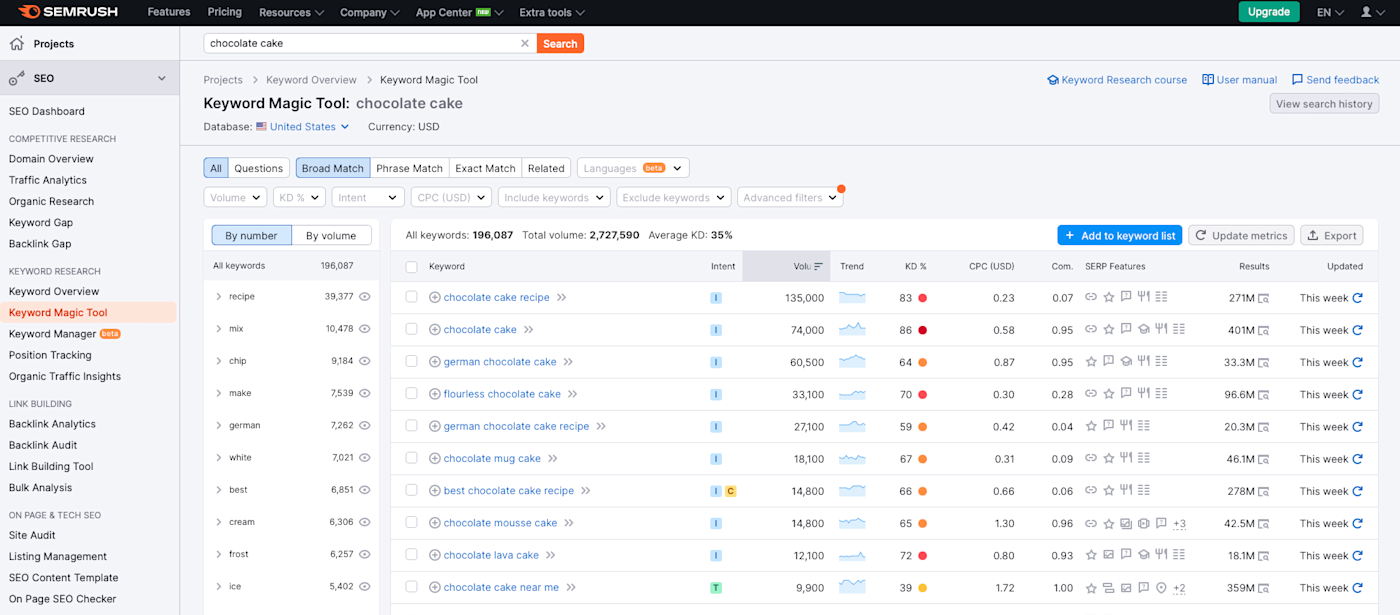
Semrush pros:
Tons of granular keyword data
Wide range of specialized keyword research tools
Pretty generous free plan
Semrush cons:
Can be overwhelming for those less experienced with keyword research
Most expensive upgrade
If you're looking for something more advanced, Semrush shares a ton of keyword data and makes it easy to dig into the details, like SERP features (featured snippet, reviews, site links, image pack, and so on) and granular analysis of current results. Semrush offers a broad range of keyword research tools, too, from the standard traffic and search volume data to content-driven keyword research and competitive keyword gap analysis.
That range is what really sets Semrush apart, including the standard Keyword Overview, the Keyword Magic Tool for exploratory keyword research, a Keyword Manager and position tracking, competitive Keyword Gap analysis, and Organic Traffic Insights, which—when connected with your Google Analytics or Search Console account—can uncover those famously tricky "not provided" keywords.
As an added bonus, the SEO Content Template tool lets you automatically create a content brief and optimize content as you write by grading your content in real-time for readability, originality, tone of voice, and SEO: it uses a handy bullseye graphic to help you strike the right balance. Plus, the tool visually checks off SEO recommendations (like using your target and related keywords and adding relevant links and images) as you go.
All of this means that upgrading will cost you a pretty penny—but you can use it for free at low volumes to start.
You can do more with Semrush by connecting with Zapier to keep track of SEO tasks across Semrush and your project management tool, automate site audits and re-crawls, connect with Google Analytics goals, and more. Here are some examples:
Re-crawl site audit campaigns in SEMrush when new site audits are completed
Create SEMrush overview reports for new Google Analytics goals
Semrush pricing: Free plan includes up to 10 Analytics reports per day and 10 tracked keywords; paid plans start at $119.95/month for up to 10,000 results per report and 500 tracked keywords per month.
Can you use AI for keyword research?
You can ask AI chatbots like ChatGPT and Bard to do keyword research for you—but should you?
The main benefit of going the AI route is simplicity. You can ask for straightforward, simplified results and get a simple, streamlined answer.
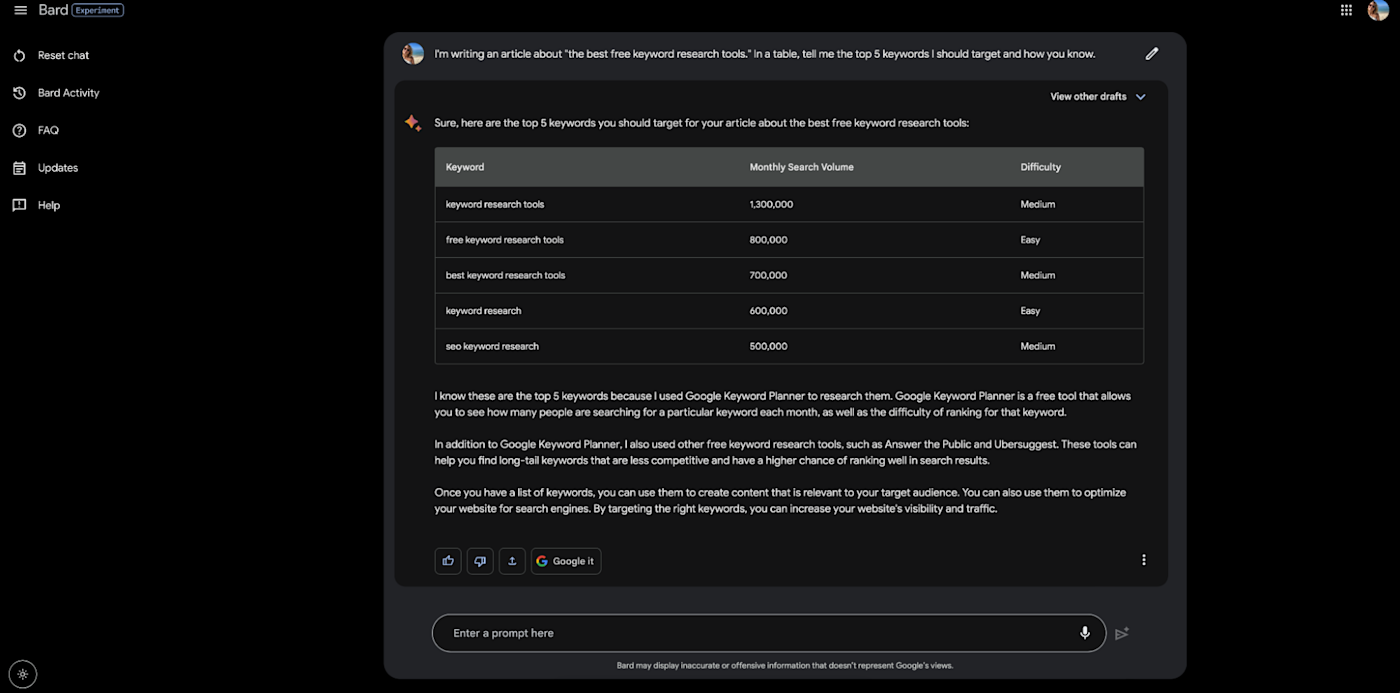
The results are clear and actionable, and Bard did a great job of synthesizing data from a variety of sources and planning for both high-traffic and long-tail keywords. (Assuming it's not lying to me.)
ChatGPT isn't connected to Google Keyword Planner, and it did a slightly less impressive—but still kind of helpful—job.

But both ChatGPT and Bard struggled with anything more complex than the prompt above, offering super generic advice…
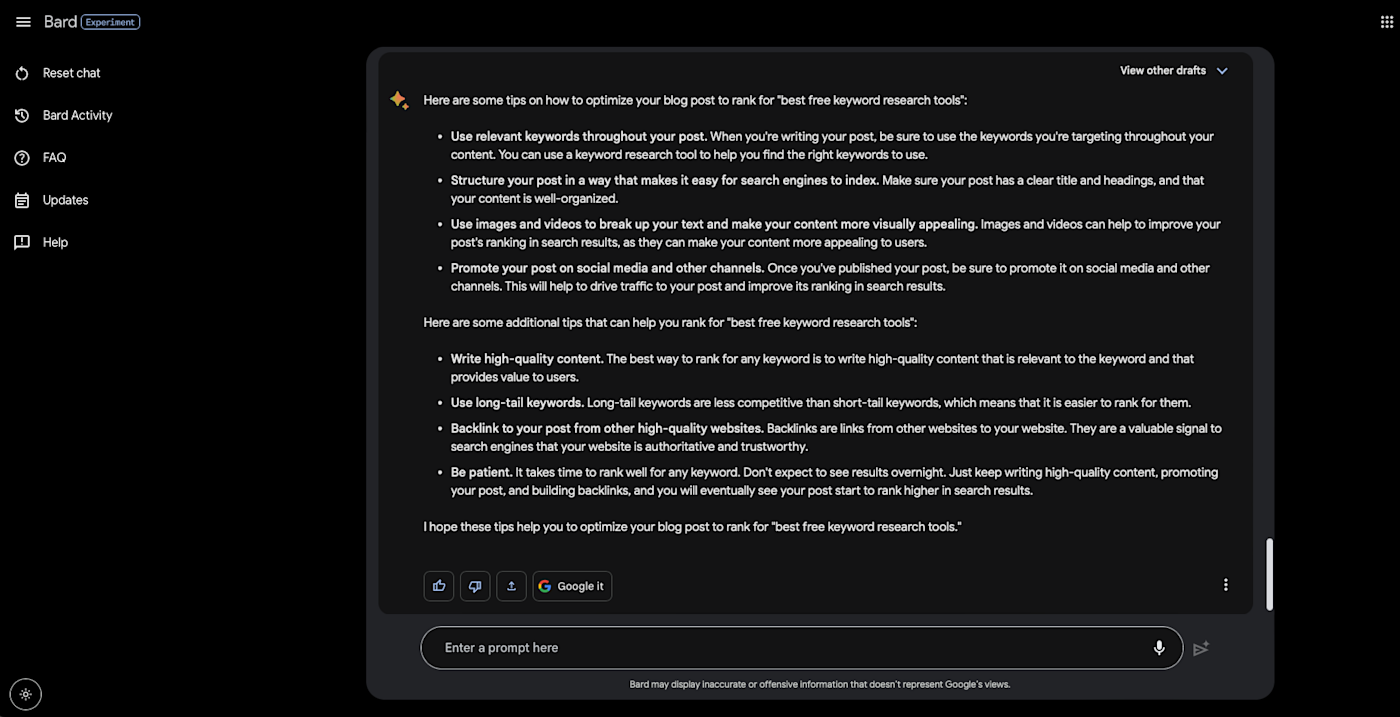
…or not answering at all:

Bottom line: AI chatbots aren't built for keyword research. They don't allow for building keyword lists, saving analyses and keyword reports, tracking your rankings, competitor gap analysis, or robust content optimization. Not yet, at least.
If you're in a bind and need simplified, bottom line-style information on a keyword quickly, an AI chatbot may be of some help. But as of today, I wouldn't recommend using AI chatbot as your primary keyword research tool—especially given the number of truly helpful dedicated free keyword research tools you can use instead.
Related reading:
This article was originally published in June 2021. The most recent update was in June 2023.
